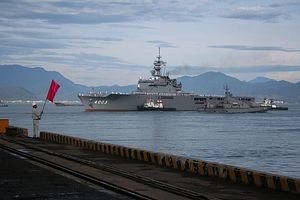From June 4-8, Vietnamese Prime Minister Nguyen Xuan Phuc paid a four-day visit to Japan. The visit, his second since assuming this position last April, reinforced the importance of the bilateral relationship, which had been elevated to the level of an extensive strategic partnership back in 2014.
Japan and Vietnam have long had an important relationship. The initial focus of ties was economic, and Japan has evolved to become Vietnam’s largest source of official development assistance, second largest foreign investor, third largest tourism partner, and fourth largest trading partner.
But there has been increasing security cooperation as well in recent years, especially with common concerns about China’s maritime assertiveness in the East and South China Seas. This dimension of ties has grown to include not just exchanges and visits, but regular dialogues, port calls, and capacity-building and the sharing of best practices.
The momentum in ties continued through 2017 as both countries prepare to commemorate the 40th anniversary of the relationship in 2018. In February, Japanese Emperor Akihito and Empress Michiko had their first ever state visit to Vietnam, following Japanese Prime Minister Shinzo Abe’s own visit to the country in January. And this week, Phuc embarked on his four-day visit to Tokyo.
Phuc’s trip, which came after his recent voyage to the United States to meet President Donald Trump, consisted of a number of engagements including meetings with Japanese political and economic figures, a summit meeting with Abe, a keynote address at an investment conference, and attendance at the 23rd International Conference on the Future of Asia.
Most of the focus during the visit was on the economic domain, with Phuc and Abe witnessing the handover of agreements worth $22 billion following the investment conference on Vietnam, which Phuc labeled “historic.” The media attention to this part of the relationship was also unsurprising since both countries are part of the Trans-Pacific Partnership (TPP), whose future is uncertain following Trump’s withdrawal, and Vietnam will be hosting the Asia Pacific Economic Cooperation (APEC) summit later this year.
But there were developments on the security side as well. For instance, one of the exchange of notes of yen loan projects signed by the two sides on June 6, which had been pledged by Japan in 2016, was for the Maritime Security and Safety Capacity Improvement Project where Tokyo would deliver six patrols boats to the Vietnam Coast Guard in a deal worth 38.482 billion yen ($344 million). And during the June 5 meeting between Vietnam’s Deputy Defense Minister Nguyen Chi Vinh and his Japanese counterpart Ro Manabe, both sides hailed the trajectory of current collaboration and pledged to ink a vision plan for the future of Vietnam-Japan defense cooperation.
There were a string of other developments as well, which both sides incorporated into a joint statement on deepening their extensive strategic partnership. In the statement, both sides expressed satisfaction at the “robust, comprehensive, and substantive growth” of the Vietnam-Japan relationship, even in the face of challenges like protectionism as well as “complex developments” continuing to take place in the South China Sea.
































